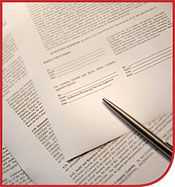
|
PLG-401
ADVANCED LEGAL ANALYSIS AND WRITING
3 Credits
|
This course is a part of:
Certificate Program
Associate's Degree Program
Bachelor's Degree Program
Required Prerequisite:
PLG-108:
Legal Research, Writing and Civil Litigation
In addition, the student must have received a grade of B or higher in any one of the following:
This course may not be taken before a student has completed at least four (4) paralegal courses at NPC without prior consent from the education director. Such permission will be granted only upon a showing that the student has a significant educational or employment background in legal writing.
This course is an advanced course that seeks to refine the student's ability to write in a formal, legal manner. In addition, students will receive training in drafting legal memoranda and briefs. The course will look at the different types of legal memoranda and writings that exist. It will differentiate between the forms of legal writing and train the students in the art of adapting one's writing to the given situation. The student's familiarity with legal research through Lexis or other means and basic knowledge of the United States court system and the differences between mandatory and persuasive authority are presumed. The course will focus on developing the ability to apply legal research to the creation of the written legal document. Students will be asked to research, draft and submit an appellate brief based on an assigned fact pattern and fictitious procedural history.
Course Learning Outcomes
At the completion of this course, the student will be able to:
- Appropriately cite any authority, including cases, statutes, law review articles, secondary authorities, etc. (sometimes with the assistance of other sources)
- Appropriately differentiate between the various types of legal writing, including the intra-office memorandum, the legal brief, etc.
- Properly organize, using the I-R-A-C method in organizing a legal essay or memorandum
- Write in a clear, concise and legalistic manner
- Distinguish between the process and applicable rules in analyzing statutes and cases and be able to apply each skill when appropriate
- Distinguish between mandatory and persuasive authority and determine how much weight to give each in varying situations
- Identify and apply the key facts and rules in cases and statutes
- Separate, identify and draft the varying components of a legal brief, including the table of contents, table of authorities, question presented, argument and conclusion
- Appropriately revise and edit legal writings to avoid excessive legalese, verbose or incomprehensible language and other legal writing errors